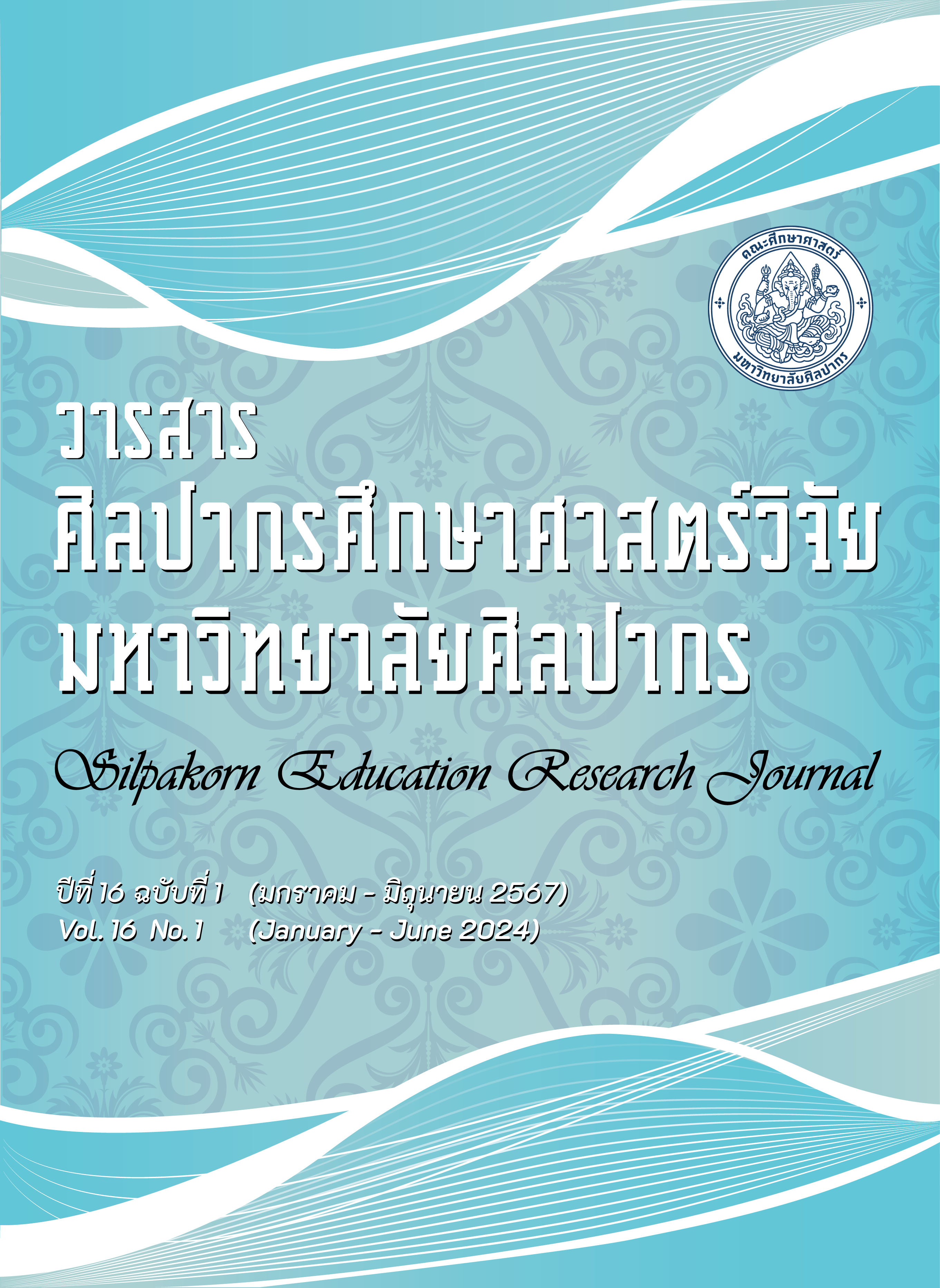การเสริมสร้างพลังอำนาจให้กับผู้นำกีฬาและการออกกำลังกายชุมชน
คำสำคัญ:
การพัฒนาการเสริมสร้างพลังอำนาจ, ผู้นำชุมชน, ผู้นำกีฬาและการออกกำลังกายบทคัดย่อ
การวิจัยครั้งนี้มีวัตถุประสงค์เพื่อ (1) ศึกษาคุณลักษณะของผู้นำกีฬาและการออกกำลังกายชุมชน (2) พัฒนารูปแบบ (3) ทดลองใช้และประเมินปรับปรุงรูปแบบ ใช้ระเบียบวิธีวิจัยแบบการวิจัยและพัฒนา การศึกษาคุณลักษณะของผู้นำกีฬาและการออกกำลังกายชุมชนจากสมาชิกชมรมกีฬาจังหวัดสุพรรณบุรี ได้แก่ ผู้ให้ข้อมูลหลัก 10 คน ด้วยการสัมภาษณ์เชิงลึก และกลุ่มตัวอย่าง 380 คน ด้วยแบบสอบถาม รูปแบบพัฒนาจากข้อมูลคุณลักษณะของผู้นำกีฬาและการวิเคราะห์องค์ประกอบเชิงทฤษฎีผู้นำการเปลี่ยนแปลง ประเมินรูปแบบโดยผู้เชี่ยวชาญ 5 คน ทดลองใช้และประเมินรูปแบบโดยผู้มีส่วนเกี่ยวข้อง 15 คน ปรับปรุงรูปแบบด้วยการจัดสนทนากลุ่มผู้มีส่วนเกี่ยวข้อง 12 คน วิเคราะห์ข้อมูลด้วยการคำนวณค่าความถี่ ร้อยละ ค่าเฉลี่ย ค่าส่วนเบี่ยงเบนมาตรฐาน และการวิเคระห์เนื้อหา
ผลการวิจัยพบว่า (1) คุณลักษณะของผู้นำได้แก่ การแสดงออกถึงภาวะผู้นำ เป็นแบบอย่างที่ดี เห็นคุณค่าในตนเอง มีวิสัยทัศน์ เข้าใจความแตกต่างระหว่างบุคคล ทำงานเป็นทีม สร้างแรงบันดาลใจ มีความคิดริเริ่มสร้างสรรค์ ด้านที่มีระดับความเห็นด้วยมากที่สุดคือด้านการคำนึงถึงความเป็นปัจเจกบุคคล (2) รูปแบบการเสริม สร้างพลังอำนาจ คือรูปแบบ 4I1P มี 5 องค์ประกอบคือ 1) การมีอิทธิพลอย่างมีอุดมการณ์ 2) การสร้างแรงบันดาลใจ 3) การกระตุ้นทางปัญญา 4) การคำนึงถึงความเป็นปัจเจกบุคคล และ 5) ความสามารถในการปฏิบัติ (3) การทดลองใช้และประเมินปรับปรุงรูปแบบโดยผู้มีส่วนเกี่ยวข้อง พบว่า รวมทุกด้านรูปแบบ มีความเหมาะสมที่จะใช้ในการเสริมสร้างพลังอำนาจในระดับมาก
References
Alsop, R., Bertelsen, M. and Holland, J. (2006). Empowerment in Practice: from Analysis to Implementation. [Online]. Retrieve October 2, 2019, from http://elibrary.worldbank.org /doi/abs/10.1596/978-0-8213-6450-5
Amattayakul, K. (2010). Self Esteem and Love. Bangkok: Chulalongkorn University Press. (in Thai)
Bass, B. M. and Riggio, R. E. (2006). Transformational Leadership. (2nded). New Jersey: Lawrence Erlbaum Associates, Inc.
Chongwisan, R. (2016). Leadership Theory Research and Approaches to Development. Bangkok: Chulalongkorn University Press. (in Thai)
Cronbach, L. J. (1951). “Coefficient Alpha and The Internal Structure of Test” Psychometrika 16(3): 297 -334.
Dierendonck, D.V., Rodriguez-Caravajal, R., de Rivas, S., Herrero, M. and Moreno-Jimenez, B. (2014). “Leading People Positively: Cross-Cultural Validation of the Servant Leadership Survey (SLS)”. The Spanish Journal of Psychology 17(63).
Gibson, C. H. (1995). “A Study of Empowerment in Mothers of Chronically Ill Children”. Journal of Advance Nursing 21, (1201).
Gutierrez, L.M. and Ortega, R. (1997). “Developing Methods to Empower Latinos: the Importance of Groups”. Social Work with Groups 14(2): 23.
Lee, J. A. B. (2001). The Empowerment Approach to Social Work Practice: Building the Beloved Community. (2nded). New York: Columbia University Press.
Machinsky, P.M. (1997). Psychology Applied to Work An Introductions Industrial and Organization Psychology. (5thed). California: Brooks / COLE, 110.
Maslow, A. H. (1970). Motivation and Personality. New York: Harper and Row.
Ministry of Tourism and Sports. (2017). National Sport Development Plan Issue 6 (2017-2021). [Online]. Retrieve October 2, 2019, from mots.go.th/ewt_dl_link.php?nid=8408
Mutune, J. and Nunow, A. (2018). “Community Participation in Transformation of Rural Livelihoods and Climate Smart Farming Technologies in the Semi-Arid Lands of Kenya”. International Journal of Peace and Development Studies 9(4): 53.
National Statistical Office. (2021). The 2021 Health Behavior of Population Survey [Online]. Retrieve October 2, 2019, from www.nso.go.th/site/2014/DocLib13/ด้านสังคม/สาขาสุขภาพ/สำรวจพฤติกรรมด้านสุขภาพของประชากร/2564/fullreport_health_64.pdf (in Thai)
Nontapattamadul, K. (2010). Contemporary Social Work Theories. Bangkok: Thammasat University Press. (in Thai)
Office of National Economics and Social Development Council. (2018). National Strategy (2018 –2037). [Online]. Retrieve October 2, 2019, from http://pub.nstda.or.th/gov-dx/wp-content/uploads/2021/09/20181013-announcement-national/strategy.pdf (in Thai)
Prommak, S. (2011). Leadership and Encourage Engagement of People in Touring Development of Khao Chaison Subdistrict Administrative Organization Phatthalung Province. Master of Liberal Arts Thesis Program in Political Science Graduate School Faculty of Mahidol University. (in Thai)
Roger, C.R. (1961). On Becoming a Person. Boston, MA: Houghton Mifflin.
Sutas, B. (2014). “Guidelines for Strengthening Good Governance in Thai Society by Develop Consciousness and Value through Proverb”. Office of the Ombudsman Journal 7(2). (in Thai)
Thongyu, D. (2012). “Application of Psychological Theories for Public Mind Development of Thai Children and Youth”. Valaya Alongkorn Review Journal 2(1). (in Thai)




